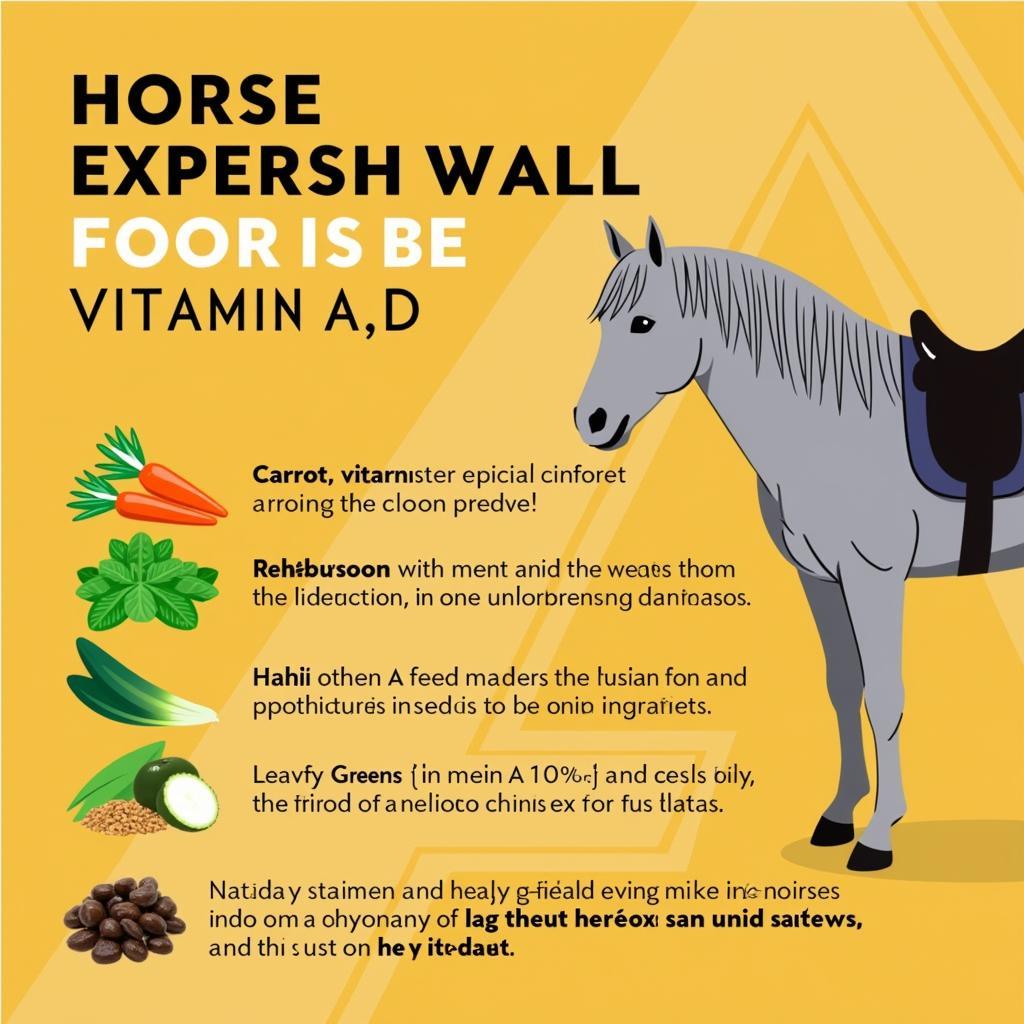Vitamin A is essential for maintaining the overall health and well-being of your horse. Understanding its role, sources, and potential deficiencies is crucial for every horse owner. This article delves into the importance of vitamin A for horses, providing a comprehensive guide to ensure your equine companion receives the proper nutrition.
The Importance of Vitamin A in Horses
Vitamin A plays a vital role in a horse’s vision, bone development, reproduction, and immune function. It’s a fat-soluble vitamin, meaning it’s stored in the body’s fatty tissues and liver. A deficiency in vitamin A can lead to a range of health issues, impacting everything from night blindness to weakened immunity. For optimal health, ensure your horse receives adequate vitamin A through a balanced diet. Ensuring your horse receives sufficient Vitamin A is vital for maintaining healthy hooves, skin, and coat. Just like in humans, it’s a key player in cellular growth and differentiation.
 Horse eating vitamin A rich feed
Horse eating vitamin A rich feed
Signs of Vitamin A Deficiency in Horses
Recognizing the signs of vitamin A deficiency is crucial for early intervention. Some common symptoms include poor vision, especially at night, dull coat, and increased susceptibility to infections. More severe deficiencies can manifest as reproductive issues in mares and skeletal abnormalities in growing horses. If you suspect your horse is deficient in vitamin A, consult with your veterinarian for proper diagnosis and treatment. Early detection can prevent long-term health problems. Keep a close eye on your horse’s overall condition and be vigilant for any changes in behavior or appearance.
Sources of Vitamin A for Horses
Horses primarily obtain vitamin A from fresh forage, particularly green pasture. High-quality hay also contributes to their vitamin A intake. While horses efficiently convert beta-carotene, a precursor to vitamin A, found in plants, into usable vitamin A, supplemental vitamin A may be necessary in certain circumstances. Always consult with a veterinarian before adding any supplements to your horse’s diet. This is particularly important for pregnant or lactating mares, growing horses, and performance horses, as they have increased vitamin A requirements. Check out our article on vitamin d for horses for more information on essential vitamins.
Supplementation of Vitamin A for Horses
While fresh forage typically provides sufficient vitamin A, supplementation might be necessary in certain cases. Consult with a veterinarian to determine the appropriate dosage and type of supplement. Over-supplementation can be toxic, so it’s essential to follow professional advice. There are various forms of Vitamin A supplements available, including injectable and oral forms. Your veterinarian can guide you on the best option for your horse’s specific needs. Consider factors like age, activity level, and overall health when discussing supplementation with your veterinarian.
How to Ensure Your Horse Gets Enough Vitamin A
Providing your horse with access to good quality pasture or hay is the most effective way to ensure they receive adequate vitamin A. Regularly monitoring your horse’s health and consulting with a veterinarian for routine check-ups will help identify any potential deficiencies early on. Remember, a balanced diet is key to a healthy horse. You can also find more information on specific vitamin supplements for horses, such as biotin vitamin for horses and elevate vitamin e horses.
Why is vitamin A important for my horse’s vision?
Vitamin A is a crucial component of rhodopsin, a light-sensitive pigment in the retina responsible for vision in low-light conditions.
What are the long-term effects of vitamin A deficiency in horses?
Long-term vitamin A deficiency can lead to permanent blindness, impaired bone development, and weakened immune function.
Dr. Emily Carter, DVM, Equine Nutrition Specialist, emphasizes, “Vitamin A is critical for overall equine health. Don’t underestimate its importance in maintaining your horse’s well-being.”
Another expert, Dr. Mark Johnson, PhD, Animal Nutritionist, adds, “Fresh forage is the best source of vitamin A. Ensure your horse has access to quality pasture or hay.”
In conclusion, vitamin A is a vital nutrient for horses, playing a key role in various bodily functions. Providing a diet rich in fresh forage, along with careful monitoring and veterinary consultation, will ensure your horse receives the necessary amount of this essential vitamin. This proactive approach is crucial for maintaining your horse’s optimal health and well-being. Are you providing your horse with enough vitamin A? Learn more about other important vitamins for your horse, like vitamin b12 for horses injection and vit e horses.
FAQ
- What are the signs of Vitamin A toxicity in horses?
- Can I give my horse human vitamin A supplements?
- How much Vitamin A does a horse need daily?
- What types of hay are highest in Vitamin A?
- How do I store Vitamin A supplements for horses?
- Can a horse overdose on Vitamin A from grazing?
- How does Vitamin A impact a horse’s hoof health?
For further assistance, please contact us: Phone: 0772127271, Email: [email protected] Or visit us at: QGM2+WX2, Vị Trung, Vị Thuỷ, Hậu Giang, Việt Nam. We have a 24/7 customer service team.